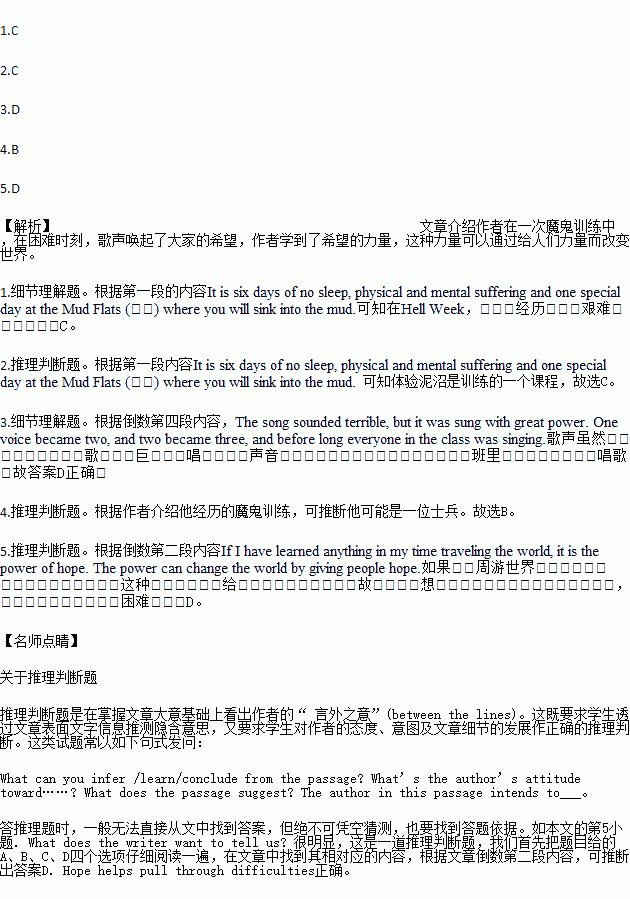题目内容
The ninth week of SEAL (Sea, Air, Land) training is referred to (意指) as Hell Week. It is six days of no sleep, physical and mental suffering and one special day at the Mud Flats (泥沼) where you will sink into the mud.
It is on Wednesday of Hell Week that we came down to the mud flats and spend the next 15 hours keeping alive in the freezing-cold mud, the cold wind and the strong pressure from the instructors to give up.
As the sun began to set that Wednesday evening, my training class, having broken some of the rules, was ordered into the mud. We sank into the mud until only our heads could be seen. The instructors told us we could leave the mud if only five men would give up — just five men and we could get out of the cold.
Looking around the mud flat, it was clear that some of us were about to give up. It was still over eight hours till the sun came up—eight more hours of coldness. Our cries were so loud that it was hard to hear anything. And then, one voice began to fly through the night—one voice raised in song.
The song sounded terrible, but it was sung with great power. One voice became two, and two became three, and before long everyone in the class was singing.
We knew that if one man could rise above the suffering then others could as well. The instructors warned us of more time in the mud if we kept up the singing—but the singing went on and on. And somehow, the mud seemed a little warmer, the wind a little weaker and the morning not so far away.
If I have learned anything in my time traveling the world, it is the power of hope. The power can change the world by giving people hope.
So, if you want to change the world, start singing when you’re up to your neck in mud.
1.What did the writer experience during Hell Week?
A. He suffered sleeplessness for one day. B. He was physically and mentally crazy.
C. He went through some hard tests. D. He sank into the mud for the week.
2.Why did the class have the experience at the Mud Flat?
A. Because they wanted to break the rules. B. Because the weather was terribly bad.
C. Because it was one of the training courses. D. Because the instructors were strict with them.
3.What did the class do when they were in the mud?
A. Five of them gave up. B. They cried all the time.
C. Someone sang from the beginning. D. Everybody joined in the singing.
4.What is probably the author’s job?
A. A terrorist. B. A soldier. C. An instructor. D. A trainer.
5.What does the writer want to tell us?
A. Singing helps change the world. B. Singing solves problems in life.
C. People should help each other. D. Hope helps pull through difficulties.


 , or just does it 8. (bad). The purpose of schools, therefore, is not to teach languages, history, science etc., 9. to teach 10. (pupil) the way to learn.
, or just does it 8. (bad). The purpose of schools, therefore, is not to teach languages, history, science etc., 9. to teach 10. (pupil) the way to learn.